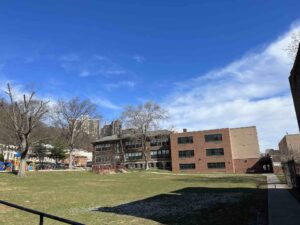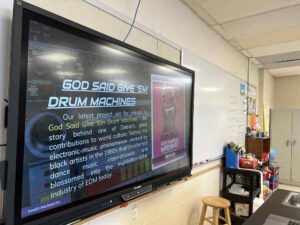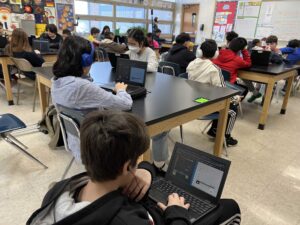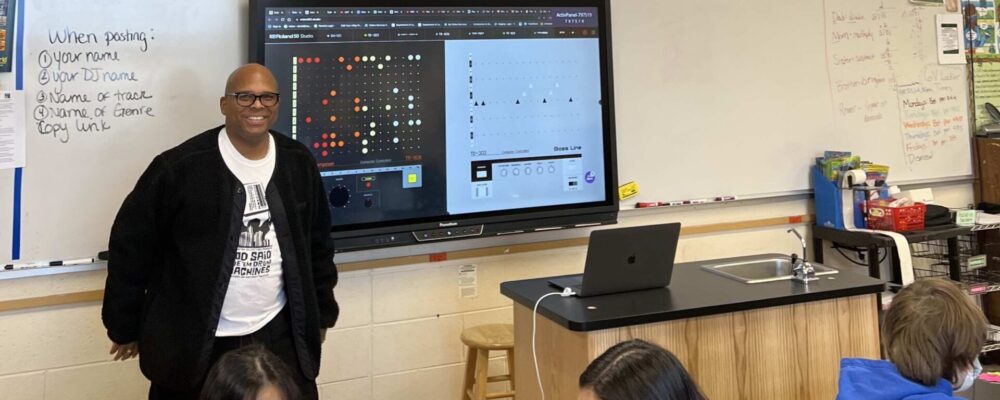 This past week I taught part of the Detroit Techno 101 curriculum at EVG Middle School in NJ. The school I visited is on the Hudson River overlooking Manhattan NY and not far from the birthplace of Hip Hop in the Bronx. I was invited to speak to social studies students on the history of Techno and our film called “God Said Give ‘Em Drum Machines” as well as, share insights on my career path as a Producer, Filmmaker and Instructional Technologist.
This past week I taught part of the Detroit Techno 101 curriculum at EVG Middle School in NJ. The school I visited is on the Hudson River overlooking Manhattan NY and not far from the birthplace of Hip Hop in the Bronx. I was invited to speak to social studies students on the history of Techno and our film called “God Said Give ‘Em Drum Machines” as well as, share insights on my career path as a Producer, Filmmaker and Instructional Technologist.
I taught a lesson called Learning about Analogue and Digital Instruments from Around The World, from a curriculum I developed called Detroit Techno 101. I designed the Detroit Techno 101 project as a complement to our film called “God Said Give ‘Em Drum Machines” and “The Music Origins Project”. For the exploration at EVG Middle School, I collaborated with the Social Studies Teacher Mrs. Castaldo who provided important background context for the students, by teaching the students a lesson about Juan Atkins and the Origins of Techno in Detroit a few days prior to my visit.
During my time with the students, we explored a number of subjects, from musical genres, to the origins of a genre like Techno in Detroit, to the creation of a track in a specific genre using electronic instruments. Many of the students in the class did not know that the genre Techno was created by a movement of teens not much older than they are in Detroit in the 1980’s. The students were excited to learn about the origins of Techno an art form that they all were familiar with but had no real background knowledge of the culture that created it.

As part of the lesson, we discussed the cultural origins of different musical genres around the world. We explored the instruments and other influences from different cultures around the world that form the basis for a music style or genre to emerge. I highlighted the complex engineering that the Japanese manufacturer Roland used to create affordable drum machines like the iconic TR-808 drum machine that changed the sound of modern music and was used to create seminal Techno, House and Hip-Hop anthems while we listen to some classic tracks that used the drum machine.
I also underscored the importance of documenting the art and music that is being created around them with their cell phones so they can tell their own historic and cultural stories as I did with my film. The documentary film God Said Give ‘Em Drum Machines took our team many years to complete because we had to locate original source materials like magazine articles, video footage, audio mixes, audio interviews, party flyers, and of course we needed to locate people we can interview about events that happened many years in the past. Cell phones enable young people to document emerging art and culture movements that are happening around them and this is the reason we are teaching students the process of smartphone filmmaking and Digital Storytelling as part of the Detroit Techno 101 curriculum.

As a next step in the lesson, I explained how Jeff Mills influenced a generation of teens in Detroit with his live mixes on the radio as “The Wizard” and how I became a Teen Reporter for WJLB when I was in High School just to sneak a peek at his radio set (see lessons Detroit Radio And Afrofuturism or Detroit Radio Genres for more info). I then showed a demo of the Techno mastermind and co-founder of the group, Underground Resistance, Jeff Mills playing the TR-909 live. This video was shown at the Louvre Museum in Paris during his residency there. This clip was used to model the sound of Detroit Techno and to show the kind of manual dexterity that went into playing the original instrument live. I then showed the students how to program beat patterns with an electronic drum machine like the TR-808, TR-909, and how to add “a groove” with the TB-303 and then we challenged them to explore many of the other emulators available on the Roland 50th anniversary website.
We discussed the different interfaces, filters, and functions of each of the Roland Drum Machines. We discussed the different sounds, rhythms and grooves each synthesizer could be programmed to make. And then we discussed the patterns used to program a beat. The teacher and I then challenged them each to create and record their own track using any combination of instruments they choose. We gave the students about 20 min to create their tracks. After they made their track, they identified the genre or created their own genre, and then they came up with a name for their musical persona and then they were challenged to perform their track for the class. The students really enjoyed the process of creating a beat and playing their beats for the class to hear. We were astonished by the different approaches each student took and the diverse types of sounds, rhythm patterns, and beats that the students created. It was great sharing career insights and teaching STEM skills like this in the classroom.
We launched the Detroit Techno 101 curriculum at Roland’s Beat Garden at the Pan African Film Festival in the Spring in LA and we are continuing to take Detroit Techno 101 to schools across the country. Our goal was to show how intersections between art, culture, and technology can create artistic movements that can change the world.
The Music Origins Project hopes to underscore the importance of documenting the origins of culturally significant art so that is attributed to the culture that created it and so the art form can be capitalized on by the culture that created it, if they choose to do so. We feel it is important to provide kids with the tools to recognize the unique beauty of their cultures’ art and to document art and music created in their community using technology that is at their fingertips like smartphones.
Reach out to me in the comments below if you are interested in bringing this free program to a school near you.
Special thanks to the EVG Middle School staff and Mrs. Castaldo for allowing me to share this unique project with 50 or so of their wonderful Social Studies students.

